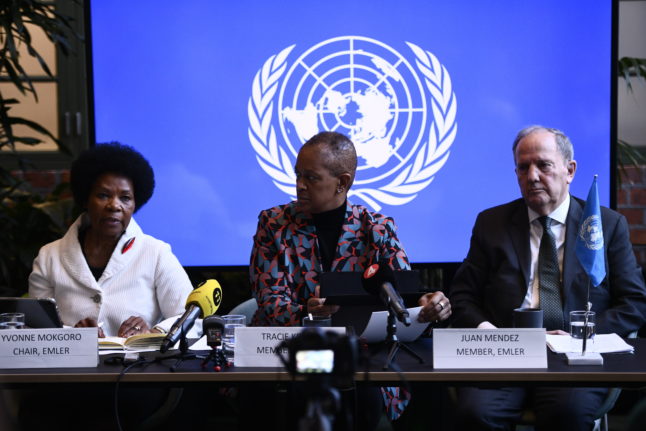In the first week of November, the United Nations sent three of its top experts on racism to Sweden on a five-day visit to meet officials and immigrants, and to examine how the country tackles race discrimination.
The group was led by Justice Yvonne Mokgoro, a US-educated lawyer appointed by Nelson Mandela to South Africa’s constitutional court after the fall of apartheid. The group included Tracie Keesee, a veteran US policewoman and deputy commissioner for equity and inclusion at the New York Police Department, and Professor Juan Méndez, a leading Argentinian human rights lawyer.
Together they make up the UN’s Racial Justice Body, set up to promote “transformative change for racial justice and equality”. They had meetings and conducted interviews in Stockholm, Malmö, and Lund from October 31 to November 4.
One could be forgiven for thinking that such a high-level visit, so soon after the country had elected a government backed by the far right, might have attracted some attention. But the Swedish media has been largely silent.
The expert group was critical of the police, pointing to low levels of trust towards them in predominantly immigrant areas of Swedish cities. But they were also “deeply concerned” by Sweden’s failure to collect statistics broken down according to ethnicity.
“The collection, publication and analysis of data disaggregated by race or ethnic origin in all aspects of life, especially regarding interactions with law enforcement and the criminal justice system, is an essential element for designing and assessing responses to systemic racism,” Yvonne Mokgoro said. “Sweden needs to collect and use this data to fight systemic racism.”
This statement by the UN expert group is not new. The European Commission against Racism and Intolerance has repeatedly (most recently in 2018) recommended that Sweden collect data in various fields broken down into categories such as religion, language, nationality and national or ethnic origin. A UN working group of experts on people of African descent recommended in 2014 that Sweden start to collect data disaggregated on the basis of race and ethnicity.
Sweden is one of very few countries that does not collect detailed statistics on its immigrant population. This means the Swedish government does not have any statistics at all on, for example, the percentage of inhabitants identifying themselves as Muslim, black, Asian or Latino. Consequently, there are no statistics whatsoever on, for example, how black Swedes are faring on the labour market, the median income level among Swedish Muslims, and so on.
The OECD, along with many academics, calls this the “colour-blind” approach to combatting racism. Historically, the colour-blind approach arose in Sweden after the horrors of Nazism shocked the country out of its shameful support for race biology.
But Sweden went further than this. In denying – correctly – that there is any scientific basis for notions of racial difference, the country made the very word “race” taboo. In 2008, the term was eliminated from Sweden’s anti-discrimination laws, despite strong criticism of this change from the UN, the Council of Europe and the EU.
Since the concept of race has been abolished from public life, at an official and legal level racial discrimination does not exist in today’s Sweden. As the Swedish government put it five years ago, the law on discrimination simply “assumes that all people belong to the same race: the human race”.
There are many consequences of this colour-blind approach. For example, the annual crime survey contains no mention of racism or racist crimes, but talks instead about general “threats” (hot), “harassment” (trakasserier) and “indignities” (kränkning).
Furthermore, it distinguishes only between victims of crime who are Swedes, were born in Sweden but with one or both parents born abroad, and those who were born abroad. These categories are far too broad to be useful indicators of racism, as the Living History Forum, a Swedish public agency, has argued.
The Swedish National Council for Crime Prevention, or Brå, goes so far as to say that immigrants cannot by definition be victims of racism unless the perpetrator of the crime believes that there are biological differences between the races. On the contrary, Brå says, negative attitudes towards immigrants are “xenophobia”, not racism: “The term xenophobia can be used to refer to negative attitudes towards people who immigrated to Sweden. The concept of racism should be considered strongly associated with biological racism, i.e. the mindset that people can be classified into better or worse races.”
The colour-blind approach also has a broader impact on Swedish attitudes. Because we don’t recognise the biological concept of race, and have eliminated it from our legal system, we ourselves cannot be racist. In fact, anyone who does talk about race discrimination is acknowledging that racial differences exist, which only legitimises racist assumptions about people.
Racism is therefore, a 2005 report on structural discrimination found, largely seen as something that exists only in other countries, in history, or among a few confused young men such as skinheads.
“This means that many, and in particular privileged, people deny the structural character of race discrimination and can thus avoid criticising themselves,” the report concluded. The denial of race discrimination is “a thread that runs through Sweden’s immigration policy, and later its integration policy, as well as in its failure to tackle ethnic discrimination in working life as well as other parts of society”.
Consequently, when anyone tries to argue that Sweden needs to collect data on race and ethnicity, they are almost always shot down in flames. This was what happened to Leila Ali Elmi, a member of parliament with Somali heritage. Hers was “race politics” only slightly less dangerous than the Nazis, argued one commentator.
The Local’s recent reader survey revealed very clearly and powerfully that Sweden is decades behind on racism and diversity, and that the experience of many immigrants is in sharp contrast to Sweden’s anti-racist image of itself. Sweden must not repeat the mistakes made by the United States in denying systemic racism, said Tracie Keesee, one of the UN experts who came here earlier this month.
If Sweden is going to move forward on this vital issue, it needs to modify its colour-blind approach and open its eyes to the racism in its midst.
David Crouch is the author of Almost Perfekt: How Sweden Works and What Can We Learn From It. He is a freelance journalist and a lecturer in journalism at Gothenburg University.



 Please whitelist us to continue reading.
Please whitelist us to continue reading.
Social activists sell this idea to minorities on the grounds that it will allow “justice” to be achieved, putatively by asymmetrical benefits from the government. But what it actually does is PERMANENTLY LABEL a class of people as being less than fully capable of independent achievement equal to the rest of society!! Black and Hispanic people in the US are just waking up to this unintended consequence now after 50 years of special “benefits.” The only way to achieve justice is for society to be totally “color blind”!
No no no, we should not introduce these racial and racist ways of working in our country. There are so many dark and dangerous paths that this would take us down on. It does not work in the US and it won’t work here either.
I am flabbergasted at how ignorant and backwards is this country when it comes to issues of race. That quote that the law “assumes that all people belong to the same race: the human race”.
Can you imagine the same approach taken to gender equality? We assume all people are the same gender: the human gender. No statistics on men vs women by pay, or positions of leadership or power. Because, we should all be “gender blind”. Absolute garbage.
There is no way to address inequality if everyone wants to stick their head in the sand like ostriches and pretend the problem doesn’t exist. It’s easy to do so when you’re part of the white majority, and you don’t experience discrimination – therefore, if everyone is the same, nobody experiences discrimnation! Just like if I was to happen to be a straight man, I never experience sexism or gender discrimination, therefore there is no discrimination! Problem solved.
When will this country drag itself out of the cave and into modern reality? Does my head in!
Ok, first off: there are not one gender, but two. Second: that is as true as we all belong to the same race, humans. Anyone who believes anything else is selling racism, either open or in disguise. We are going down a rabbit hole here, and we need to be careful. Whatever we do, we need to make sure it increases our understanding of individuals and not groups.